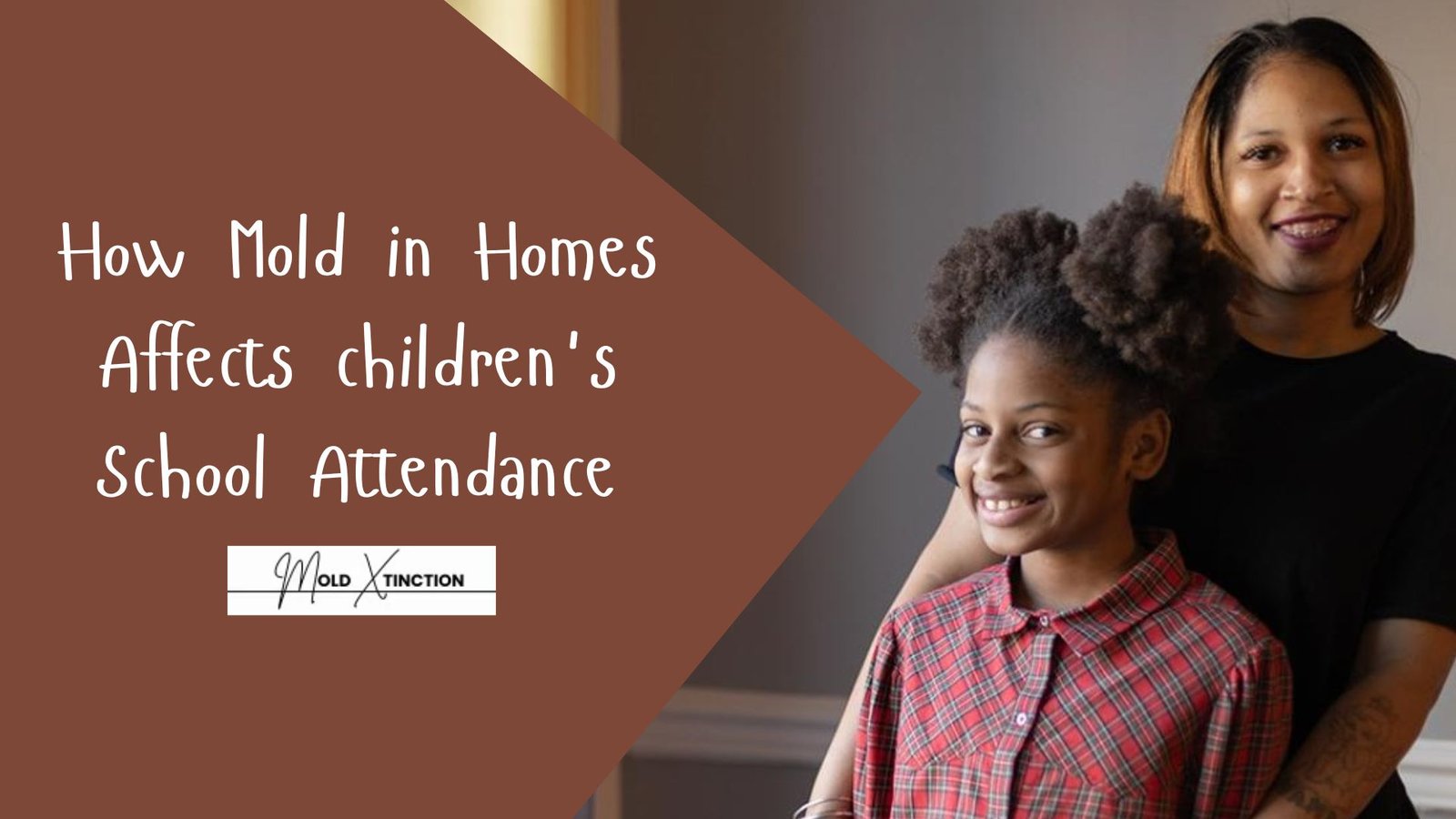Mold is a small problem at home, but it can be a big disaster when the child is involved. So don’t be wondering how mold in homes affects children’s school attendance, because to some extent, it does.
Most of the time, people think that mold is just something to make the house look dirty or smell bad but it’s actually worse.
Mold can harm your child without you even knowing it. As mold grows on the wall, ceiling or in hard to reach areas such as behind furniture or in air ducts etc., small mold spores are spread by air.
These spores enter the body of the child through breathing and that may cause sickness in the long run. They may experience coughing, sneezing or difficulty in breathing.
Some children develop rashes or headaches. There’s a possibility of having mold at home if your child is always sick.
When children are sick, they usually can’t go to school. Loss of school may cause a student to fall behind in his/ her class, weak grades and emotional stress.
So mold is not just a house problem but a school problem.
Here in this article, we will simply explain how mold in houses affects the school attendance of children, symptoms and how parents can protect their children.
Let’s start.
What's In This Article
ToggleWhy Is Mold Bad for Children?
Children are in the process of development and their body is not as strong as the adults. The reason behind this is the fact that their lungs, brain and immune system are still developing so when they are subjected to factors like mold they can get easily sick.
Mold is a fungus and appears in wet, dark and humid places such as the bathroom, kitchen, basement and also on the walls.
The molds produce the spores whose germination occurs at the tip of the growth of the molds and these are small particles which are suspended in the air.
This spore can harm the body when inhaled especially among young children.
Because of the weaker immune system, children are more prone to experience health problems related to molds at home.
Breathing in mold spores (tiny parts of mold that float in the air) can cause:
- Coughing
- Sneezing
- Stuffy nose
- Itchy or watery eyes
- Skin rashes
- Headaches
Mold worsens the problem of children with asthma or allergies. Sometimes they even have to go to the hospital.
How Mold in Homes Affects Children’s School Attendance

Now, let’s talk about how this affects kids in school.
1. Kids Get Sick More Often
A child born in a moldy house will end up feeling sick more frequently.
Mold in the air may lead to constant cough or sneezing, runny nose, sore throat, and even difficulty in breathing with no shortness of breath or wheezes.
Some kids will complain of headaches or lack of energy to do anything. Because of these health problems, parents are most of the time forced to keep them at home just to rest or even take them to the doctor.
This results to school absenteeism that can affect the child’s learning and performance in the long run.
2. Poor Sleep from Breathing Problems
Air molds can make kids hard to breathe especially at night when they are lying down. This can cause poor sleep and pain at night.
Kids don’t sleep well and hence wake up very tired, feeling weak and cranky. Others will complain of difficulty getting out of bed or being sick to go to school.
They may not be able to stay awake or concentrate or participate in class even if they go. This has long term effects on their learning and mood and general health which may not be noticeable to parents till later.
3. Difficulty Concentrating in Class
Even if kids with mold-induced health issues can attend school, they don’t give their best in their studies.
Children cannot concentrate on their studies when they are tired, they have headaches or have difficulties breathing.
They may not be able to understand what was being said by the teacher, would get difficulty in doing their homework, or interact with their classmates.
Such inattention may result to academic failure that manifest through low grades, failure to submit assignments and poor student participation.
In the long run they might start performing poorly in academics and might start lagging in their studies and this might affect their self-confidence and love for studies.
4. More Doctor Visits, Less Class Time
When a child is visiting the clinic or hospital frequently because of the mold in their body, it means they will spend more time in the waiting room than in the classroom.
Repeat absenteeism can make it hard for kids to catch up with school lessons and activities.Teachers will try to help them but sometimes they don’t have time to give extra attention to kids who miss many days.
So the child will fall behind with schoolmates. This will result to learning gaps and aftermath in their education and growth.
5. Emotional Stress
Not coming to school and being unhealthy most of the time may not only have physical effects to a child but it may make him or her feel bad too.
When children are out of classroom, they could feel left out in a group activity, exciting activities or friendships.
It may cause sadness, loneliness or even anger. Others will develop a feeling that something is not right with them or a feeling that they don’t belong.
This emotional stress may overtime cause behavior issues which may be acting out or school refusing. All this makes learning harder for the kid.
Real-Life Story: Sarah and Her Fight
Sarah is a nine-year-old girl and loved attending school. This however changed when the family moved into a house that had mold in the walls.
Her nose was bleeding constantly, she would sneeze in the mornings and even miss days at school. She started performing poorly and stopped playing with friends.
Later her parents found out that there was black mold behind the kitchen walls.
And they called a professional mold remediation company and after treatment, Sarah started to feel better and attend school regularly..
How to Know If Mold Is in Your Home
Sometimes mold is easy to see. But often it hides behind walls or under carpets. Here are signs to look for:
- Stale aroma which cannot go away
- Brown patches on walls, ceilings or tiles in the bathroom
- Water stain or peeling paint
- Family members always coughing or sneezing indoors
- Feeling better outside the home than inside
If you see or suspect any of these, take it seriously.
What Should Parents Do?
1. Take Your Child’s Health Seriously
When your kid is sick at home all the time but when he/she is away (in school, at a friends house or visiting grandma), the probable cause may be mold!
When a child continues falling sick, then there is a possibility that something in the house may be causing it.
It is not always easy to spot mold. In some cases it is hidden within the walls, the ceiling or under the furniture.
Due to this, children may inhale the spores of molds without knowing it yet it may cause them to become ill.
Even when you are very busy and have other events to deal with, these warning signs should not be overlooked.
Don’t brush them aside and think about having your house checked. Your child’s comfort and health should be your top priority.
2. Check for Mold Regularly
Check in humid areas such as bathroom, laundry, basement and kitchen as these places are warm and wet which is perfect breeding ground for molds. Molds can grow where you don’t see it on a daily basis.
Take time to check the room corners, at the ceilings, behind heavy furniture and under sinks or cabinets.
Check also by windows, especially when you see water mark or condensation. Remember to move things like your fridge or washing machine to check what’s behind them.
Mold doesn’t show itself in the open so you should be keen enough to check the house thoroughly to get any sign of mold.
3. Keep Your Home Dry
Mold grows in wet areas. Try to:
- Fix any leaks quickly
- During showering use a fan or open windows
- Rooms should be ventilated well
- Use dehumidifier in case the house is too damp
4. Clean Minor Mold Safely
When you notice some form of mold like when it is on the bathroom, on the tiles or on the edges of your sink in the sink, in most case, you can clean the mold off using soaps and water on it or using some well natural cleaning substances like white vinegar.
During cleaning, wear gloves and ensure the places are well aired. However, when the mold spot is large, recurrent or on walls, ceilings or beneath the floorboards, you cannot do the cleaning by yourself.
Mold problems that are large or concealed are unhealthy to your health. Once it occurs, then the most appropriate course of action is to call a specialized mold remediation company.
When a Professional Mold Remediation Service is Required?
Where to get experts? When mould is concealed within walls and beneath floors or when it is multiplying rapidly, you should have professionals.
The duty of a Mold specialists:
- Know how to find hidden mold
- Have safe equipment to remove it
- Prevent mold from coming back
- Keep your home safe for your family
Hiring a practitioner is not only the smartest but the safest way to protect your child’s health and his attendance at school.
Mold and Your Child’s Future
Missing school because of mold may not sound serious at first. But over time it adds up:
- Bad grades
- Falling behind in class
- Low confidence
- Less chance to succeed
Each school day is important. When children are healthy they perform way better in all aspects of life.
They can learn faster, stay focused in school and they like to spend time with their friends. They can be more active, helpful, playful and full of energy which is characteristic of healthy kids.
When the home has a mold problem then it can silently affect their health without anyone realizing it immediately.
Unannounced like an army, mold disappears behind walls, ceilings and places where water is seeping.
Good thing it can be prevented. Proper measures and assistance from an expert is possible and will make your house yours again.
Helpful Guide: Mold Prevention Tips Every Busy Mom Should Know
Conclusion
In summary, mold in the house is not just a housekeeping issue; it’s a health and pedagogical concern especially to children. When children are exposed to mold they mostly get sick, miss school and can’t follow up their studies.
This can over time affect their working confidence as well as performance and overall well being. But as a mother or father it’s good to act when you realize that there are signs of molds.
Don’t wait until it’s too late. Healthy home enables children to grow and progress in life by growing and learning in a healthy home. The safest and best thing you can do when you suspect that there’s mold formation in your house is to call a professional mold remediation service.
They have the equipment and expertise to eliminate the mold in an efficient way and will leave your residence safe again.
Exposing your child to these risks is not worth his or her well-being, his or her happiness and his or her future. The moment to do something and provide them with the healthy environment they require is now if you really love them.


